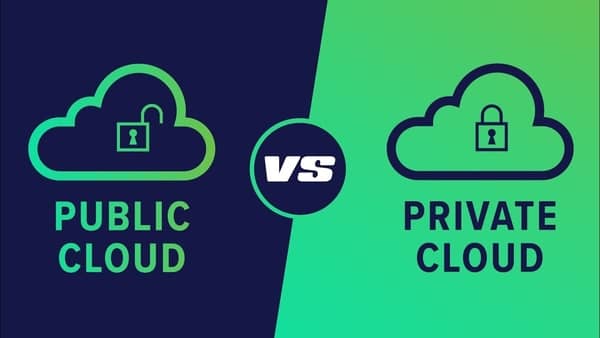
How to Build a Data Center: Design Standards and Restrictions
December 8, 2021
What Is Cybersecurity Automation?
December 14, 2021Modern companies depend on their network to deliver various services, applications, and other things to their users. Almost all businesses count on this type of network infrastructure for everyday business interactions. There are various ways to deploy this kind of structure. Businesses can build their infrastructure from the ground up and manage their network, it can use a colocation data center and take advantage of the many benefits of state-of-the-art infrastructure. Or it also can work entirely through cloud computing. All of these options can offer various benefits.

How Does Cloud Networking Work?
Moving data to the cloud may be more commonplace these days, but because this concept isn’t frequently discussed in everyday conversations outside of data center and IT personnel, it’s still important to discuss the cloud how it affects network infrastructures and vice versa. The cloud and cloud computing still refer to a physical location that houses computer servers. Through these cloud data centers, cloud computing and all of its endless power are offered to users in remote locations. This virtualization of power and technology is allocated to different users in various locations. This means that companies and businesses don’t need to build these systems for themselves, but they can use a data center’s computational and networking power through the internet.
Businesses that use cloud computing can store complete applications within a virtualized infrastructure and can harness its power anytime. Again, these organizations don’t need to build their physical infrastructure, but instead, use resources from their data center provider. This makes it easier to scale up and down as your business grows.

What Is the Difference between a Public Cloud and a Private Cloud?
When it comes to a cloud computing environment, users will be remotely accessing a remote cloud network through an internet connection. With this being said, there are differences when going through a public cloud vs. a private cloud. A public cloud is normally owned and managed by a third-party provider. Public clouds and their third-party providers usually host multiple users on the same setup. Every user within this infrastructure is partitioned out to have their part of the server, but they are all within the same connected environment. A public cloud is a popular option for many individuals and small to medium-sized businesses. Some of the most well-known public cloud or public cloud computing platforms are Google Cloud and Microsoft Azure.
The other option is the private cloud route, which is a more focused and dedicated resource. Users are hosted on private servers that aren’t shared by any other person or organization. These private servers are typically hosted within enterprise data centers or colocation data centers. The main difference between a public cloud and a private cloud is that it is not shared with any other person or organization, which means that all of the resources are solely being used by one entity. Private clouds are known to be more secure. This also means that it is a more costly option for its users. Private clouds are more often utilized by medium to large-sized businesses.

How Does Network Connectivity Work?
Network connectivity refers to the process of connecting the numerous parts that make up a network. When a company creates an IT infrastructure, they need to make sure everything works together seamlessly. Various routers, switches, gateways, and more connect an organization’s network through ISPs or internet service providers. The two aspects that help measure good network connectivity are bandwidth and latency, which measure the size and speed of data transfer.
The first of these aspects, latency, measures the time it takes for data to travel from one point to point on a network. Latency can also be thought of as a measure of delay. The lower the latency—the better. Low latency means that there is almost no delay when transferring data from one point to another. High latency means that there could be a lot of delays when moving data from one point to another.
The second part of measuring good network connectivity is bandwidth, which measures how much data can travel from one point to another at one time. A connection with a larger bandwidth can move data faster and easier than a connection with lower bandwidth. The example that is usually used to explain this idea is the example of a straw. The larger or wider the straw is, the easier and faster liquid can go through it.

How Can Various Connectivity Solutions Affect Cloud Networks?
Understanding what your company needs is an important aspect of choosing the right connectivity solution for your business operations. Multi-cloud and hybrid clouds need a direct connection to enable the utilization of cloud resources. Using a colocation data center through a colocation provider can provide lower latency along with better security. This can also improve the overall distribution of applications.
Utilizing a multi-cloud environment permits businesses to spread out their storage resources to different locations and various providers. If one of these clouds goes through an outage, one of the other clouds can take over. Again, implementing this type of deployment is oftentimes more successful with a trusted data center provider. All of these various connectivity solutions can be effective when deployed with the proper support from trusted professionals with relationships and connections with various carriers.
Conclusion
Network connectivity is a vital part of how companies operate. Many companies have been virtualized and rely on network connectivity, online presence, and fast data transferring to increase business productivity and overall sales. Whether a company uses a traditional cloud approach, a hybrid cloud approach, or a multi-cloud environment, partnering with a trusted data center provider is a vital aspect of building a successful network. A data center provider like Colocation America can help manage these various network deployments while offering additional benefits including state-of-the-art security, redundant emergency power systems, 100% uptime, 24/7 technical support, and more. Network connectivity is an important aspect of modern business, and a trusted data center provider can help all companies deploy a successful cloud network.
